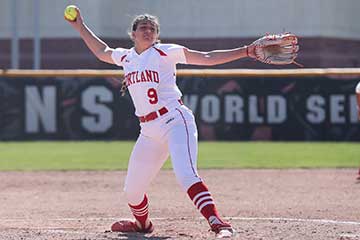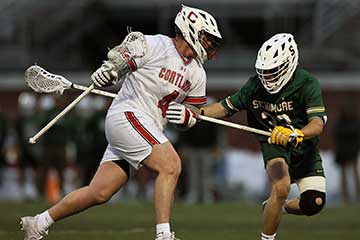Bulletin News

03/28/2023
Division III student-athletes face some difficult challenges and no easy answers.
To help them, faculty and professional staff at SUNY Cortland created the Institute for DIII Athlete Wellbeing and Athletic Leadership Virtual Symposium. This year’s event took place Monday, April 3 from 10 a.m. to 3 p.m.
This second annual symposium, with the theme “It is Not an End But a New Beginning: Knowledge and Tools for Healthy Transitions Within and Away from Athletics,” supported and trained athletes, coaches and administrators involved in DIII sports. It aims to start a national conversation about the unique problems they face.
Bonni C. Hodges, a professor of health and SUNY Distinguished Service Professor, believes this series of symposiums may be the first of its kind to focus on DIII athletics.

“It is not so much that DIII athletes have unique wellbeing challenges but rather fewer staff, services and support structures to assist with the ones they have,” she said.
That list of challenges can be long. From mental health issues like anxiety and depression, to misuse of alcohol and marijuana, to an uneven diet or lack of sleep, Hodges says that the time demands that student-athletes face interfere with self-care. Even if they do try to use available programs and services, their busy schedules make it difficult.
“Few, if any, DIII programs have the money to fund athlete-specific services,” Hodges said. “Balancing the competing demands of academics, athletics, extra-curricular activities and social lives is perhaps a greater challenge for DIII student-athletes than for those in DI or DII programs.”
Connor Griffin ’16 played baseball for four years as a Red Dragon and will be on a symposium panel discussing the transition away from being an athlete at the end of a college career. Griffin, who was a sport management major, still works in college athletics as the assistant director of event management for University of Michigan Athletics.
“It’s a transition that every athlete will have to make at some point, but it’s not always easy and is something that doesn’t really get talked about a lot at the DIII level,” Griffin said. “I think this event is important because it gives us a chance to compare experiences and hear others’ perspectives on that while hopefully providing some guidance to the current crop of athletes.”
Hodges and other faculty at SUNY Cortland created the Institute for Division III Athlete Well-being and Athletic Leadership in 2020. She believes Cortland has advantages that make it uniquely able to help other DIII schools. Division III is the largest of the three National Collegiate Athletic Association divisions. In 2020-21 almost 40% of all student-athletes participated at DIII institutions, according to the NCAA.
“Given SUNY Cortland's strengths in health, athletic training, sport management, kinesiology and athletics we felt we were in a good position ... to assist DIII programs without those strengths and to raise the visibility of well-being of DIII athletes and staff.”
The schedule for the symposium was:
10 to 10:15 a.m.
Introduction: Defining the challenge and its impact on DIII athlete wellbeing.
10:20 to 11:15 a.m.
Athlete Panel
Experiences and perspectives about making the transition away from being a DIII athlete, featuring a panel of former DIII athletes.
11:30 a.m. to 12:20 p.m.:
Networking Skill Building Workshop
Strategies for identifying, growing, and using a professional network. Start or enhance your network during the workshop. Appropriate for student athletes and others in athletics looking to make transitions within and away from athletics.
12:20 to 1 p.m.
Break
1 to 1:45 p.m.
First Year to Career: Preparing for the Transition from Day 1
Overview of a program to begin building skills for a healthy and successful transition to a life beyond sport.
2 to 2:50 p.m.
Best Practices to Support DIII Student Athlete Transition to a Life Beyond Sport
What can athletics departments do to create support systems and build skills to assist their athletes for a life beyond sport?
2:50 p.m. to 3 p.m.
Closing Remarks

